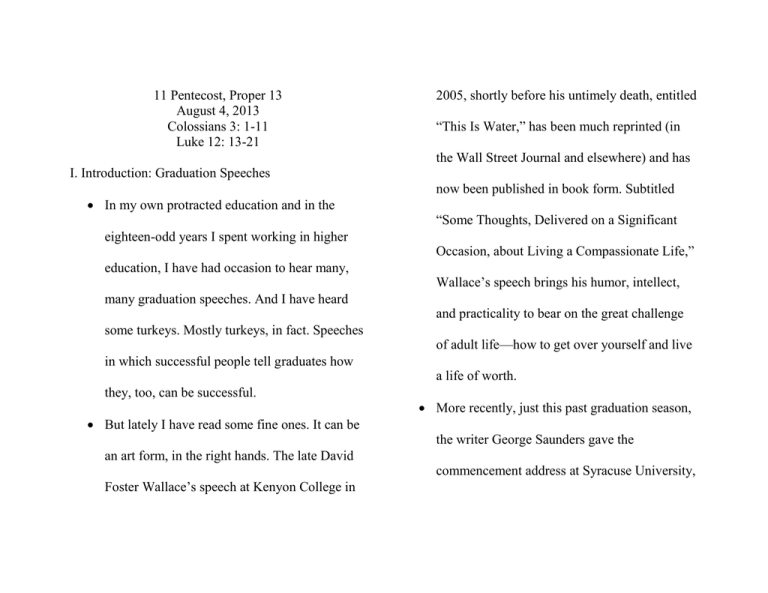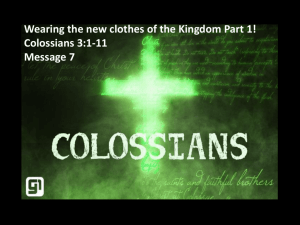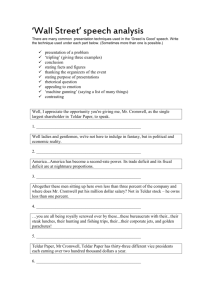the text - Christ Church Cathedral
advertisement

11 Pentecost, Proper 13 August 4, 2013 Colossians 3: 1-11 Luke 12: 13-21 2005, shortly before his untimely death, entitled “This Is Water,” has been much reprinted (in the Wall Street Journal and elsewhere) and has I. Introduction: Graduation Speeches In my own protracted education and in the eighteen-odd years I spent working in higher education, I have had occasion to hear many, now been published in book form. Subtitled “Some Thoughts, Delivered on a Significant Occasion, about Living a Compassionate Life,” Wallace’s speech brings his humor, intellect, many graduation speeches. And I have heard and practicality to bear on the great challenge some turkeys. Mostly turkeys, in fact. Speeches of adult life—how to get over yourself and live in which successful people tell graduates how a life of worth. they, too, can be successful. More recently, just this past graduation season, But lately I have read some fine ones. It can be the writer George Saunders gave the an art form, in the right hands. The late David commencement address at Syracuse University, Foster Wallace’s speech at Kenyon College in which was this week reprinted in the New York Working terrible jobs? […] No. I don’t regret Times. Saunders is self-deprecating (and honest that. Skinny dipping in a river in Sumatra [into up front) about this form of speech: “Some old which he realized, too late, monkeys were fart, his best years behind him, who, over the pooping] and getting deathly ill afterwards and course of his life, has made a series of dreadful staying that way for seven months? Not so mistakes […], gives heartfelt advice to a group much. Do I regret the occasional humiliation? of shining, energetic young people, with their Like once, playing hockey in front of a huge best years ahead of them.” Respecting that crowd, [trying to impress a girl and scoring on tradition, Saunders goes on to say that one his own goalie and then sending his stick into useful thing you can do with an old person is the crowd, almost hitting the girl]? No. I don’t ask, “Looking back, what do you regret?” even regret that.” “So,” Saunders continues, “what do I regret? Then he tells the story of something he does Being poor from time to time? Not really. regret. He tells the story of a new girl in seventh grade, a girl who was small, shy, my life are failures of kindness. Those moments nervous, wore glasses, chewed her hair. She when another human being was there, in front was mostly ignored, occasionally teased. And of me, suffering, and I responded sensibly. she looked hurt by that treatment: “eyes cast Reservedly. Mildly.” Hard to implement, but down, a little gut-kicked, as if, having been nonetheless a goal in life you could do worse reminded of her place in things, she was trying, than: “Try to be kinder.” as much as possible, to disappear.” And then Contrast this with Ivan Boesky’s speech in she did—disappear. Her family moved, and she 1986 to graduating students in the business was gone. school of UCal Berkeley: “Greed is all right, by Why, Saunders asks, forty-two years later, is he the way. I want you to know that. I think greed still thinking about that? Relative to the other is healthy. You can be greedy and still feel kids, he was pretty nice to her, so why is he good about yourself.” This was a real-life bothered? His answer: “What I regret most in version of the speech given by Michael Douglas’ corporate raider character in Oliver 1991 asking respondents the most influential Stone’s 1987 film Wall Street: “Greed is good. book in their life. Greed is right. Greed works. Greed cuts Jesus, in contrast could not be clearer in today’s through, and captures the essence of the gospel: “Take care! Be on your guard against evolutionary spirit. Greed in all its forms—for all kinds of greed; for one’s life does not life, for money, for love, knowledge—has consist in abundance of possessions.” marked the upward surge of mankind.” Ayn Rand, she of the gold dollar-sign brooch and II. Gospel: The Parable of the Rich Fool Out of the crowd, a man has come to Jesus, the author of The Virtue of Selfishness, still has asking him to help him get from his brother devoted followers who are powerful political what is due to him from their father’s estate. and business leaders. Atlas Shrugged was This is Jesus’ response: don’t be greedy; don’t second only to the Bible in a Library of desire possessions, things, stuff; that is not Congress and Book of the Month Club poll in where or what life is. Then he tells the parable of the rich fool. This Notice how in the rich man’s thoughts the first man’s land produces abundantly. And he thinks person pronouns predominate: I, me, my. His to himself that he has no place to store all that concern is only for himself—not for his he has made. So he plans to pull down his barns neighbors, not for those who have no means to and build larger ones to store all his grains and produce their own crops, not for the alien or the his goods. And then he plans to relax, eat, orphan or the widow. Concern for the poor—at drink, and be merry. But he misses the last part the heart of Jesus’ ministry and a central of that old biblical formulation. God reminds element of the sanctified life in the whole him. “Tomorrow you die.” “You fool! This biblical tradition—is never mentioned. Rather, very night your life is being demanded of you. we hear about his crops, his barns, his goods, And the things you have prepared, whose will his life. they be?” Where is his gratitude, his thankfulness for the author of life, the creator whose hand has provided his good fortune? Where is his God says “No, you’ve got that wrong.” So if awareness of the limits of his life, of its we’re not central, separate, or permanent— boundedness by death? what are we? Why is this man so selfish? Here’s a thought. He has the same built-in confusions that we all III. Conclusion: Paul, “Christ is all in all” Paul answers this question in his letter to the share: 1.) that we are central to the universe, Colossians when he reminds his readers of our personal story being the only really their baptism, the source of their true interesting story; 2.) that we are separate from identity, the true self for Christians. In your the universe (there’s ME, and then there’s all baptism, “you have died” and “you have that other stuff out there); and 3.) we’re been raised with Christ,” and “your life is permanent (death is real, sure, but I’m not dead hidden with Christ in God.” Therefore, you yet). (Saunders) should be desiring those things that are with God, of God, where Christ is. For Christians, this is the essential element How do we do this? Jesus says, “Take care!” of our identity: “Christ is all in all.” In our “Take heed,” the KJV says. The Greek life as the church, bound together in our construction is “be seeing!” Pay attention! baptism, we are not yet the kingdom of God, Look outward, around you, attend to the but we do anticipate the fulfillment of our people you encounter and be aware of your life in that—“we are hidden with Christ in own motives and actions. And, as George God.” In other words, we do not know who Saunders told the graduates, be kinder. we will ultimately be, how all this will work Remember that Christ is in the other, in all out. But Christ is in all of us, each of us; we the faces we meet, both here in this gathered are all guided by the same spirit. We have to body and in the community we live in. trust. We have to commit to our unity. We As the Cathedral family, what do we want, have to grow and mature together as we what is our desire? To be our best selves, to search for God’s revealed way together. be doers, to be accomplishers, to be dreamers in the mission God gives us. But also not to forget that our true and only life is in God, in Christ—in loving, kind, forbearing and forgiving and generous relationship with each other and all who come to us to share in this life. AMEN








